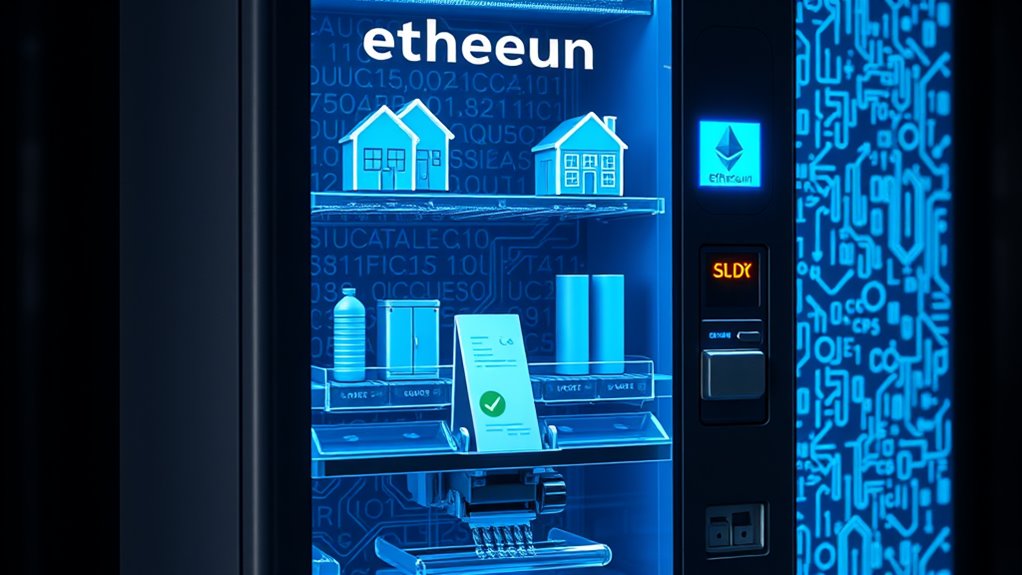What Is a Smart Contract?
Note: This post may contain affiliate links, and we may earn a commission (with No additional cost for you) if you purchase via our link. See our disclosure for more info. The gold and crypto world is constantly changing. This is not financial, investment, legal, or professional advice. So, please verify the information on the gold and cryptocurrency provider’s websites.
A smart contract? Really, it's just a self-executing agreement coded into blockchain. No middlemen required, which is great because, let's face it, who likes paying fees? It runs on “if/when…then…” logic—when conditions are met, boom, it executes. It's like magic, but with a lot less fluff. Transparency, security, and accuracy are baked in. Want to know how this tech is shaking up industries? Stick around, there's more to uncover.

In the wild world of technology, smart contracts are like the cool kids who don't need a babysitter. They're self-executing contracts, written in code on a blockchain, that automate agreements without the need for intermediaries. Goodbye lawyers and lengthy paperwork! These contracts combine code execution with a decentralized, immutable ledger. It's like Nick Szabo's vending machine analogy—put in your coins, press a button, and bam! Your soda appears. Except, in this case, it's business deals, not snacks.
Smart contracts boast some impressive features. They operate autonomously, executing when conditions are met, all while keeping third parties out of the loop. They're immutable, meaning that once deployed, the code is set in stone—no last-minute changes allowed. Transparency is another perk; every party involved can see the contract terms and its execution history. Determinism guarantees that outcomes are consistent, no matter who's running the show. And security? Well, encrypted transactions on the blockchain keep tampering at bay. Additionally, the transactions on blockchains are traceable and irreversible, providing an added layer of reliability. Furthermore, they can trigger workflows based on specific conditions, enhancing automation in various processes.
Smart contracts are autonomous, immutable, transparent, deterministic, and secure—revolutionizing agreements without the need for middlemen.
How do these nifty contracts work? Simple: they use “if/when…then…” logic to trigger actions—like making a payment upon delivery. Nodes on the blockchain verify conditions and execute the code. Gas fees incentivize network participation. Think of it as a reward system. Oh, and every transaction is recorded irreversibly on a distributed ledger. So, good luck trying to erase your mistakes! Effective implementation requires data governance frameworks to ensure information accuracy and regulatory compliance throughout the contract lifecycle.
The use cases for smart contracts are practically endless. From supply chain management (Home Depot is already in) to finance, healthcare, legal matters, and even real estate—automated property transfers are a thing now!
The advantages? Efficiency is the name of the game. Say goodbye to manual reconciliation and hello to accuracy. Human error? Not on their watch. Smart contracts are here to shake things up, and they're doing it without breaking a sweat.
Frequently Asked Questions
Can Smart Contracts Be Used Outside of Blockchain Technology?
Sure, smart contracts can strut their stuff outside blockchain tech.
They can work on fancy distributed ledger systems like Hashgraph. Centralized systems? No problem, as long as security measures are in place.
These contracts need a reliable execution environment, which is doable. Plus, they can even chat with IoT devices for some smart automation.
Who knew contracts could be so versatile? Just don't expect them to cook dinner, though.
How Secure Are Smart Contracts Against Hacking Attempts?
Smart contracts? Yeah, they're like the wild west of the digital world. Super vulnerable, thanks to poor coding. Over 32,000 weak ones on Ethereum alone.
Remember the DAO hack? $60 million gone! The reality? Once deployed, fixing them is a nightmare.
Sure, there are fancy tools and audits, but they still miss stuff. And the losses? Over $2 billion since 2017.
It's a hacker's playground, and the stakes are high.
What Programming Languages Are Used to Create Smart Contracts?
When it comes to creating smart contracts, the language choices are pretty straightforward.
Solidity is the big player, dominating the Ethereum scene. It's got features like inheritance, because why not?
Then there's Vyper, which is like Solidity‘s simpler, more cautious cousin—emphasizing security.
Ultimately, Yul pops in for those who love low-level coding and want to optimize like a pro.
Can Smart Contracts Be Modified After Deployment?
Can smart contracts be modified after deployment? Well, yes and no. It's a tricky dance.
Some methods exist for upgrades, like the proxy pattern. But hold your horses! Upgrades come with risks, like centralization and potential disasters from human error.
Plus, once deployed, the contract's structure is pretty much set in stone.
Are Smart Contracts Legally Binding Documents?
Are smart contracts legally binding? Well, it's complicated. Some places say yes, others are still scratching their heads.
They need to tick the right boxes—offer, acceptance, all that jazz—to be taken seriously. But good luck with the tech stuff; it can trip up even the best agreements.
Plus, if you're in different countries? Yikes! It's like playing legal Twister.













One Comment